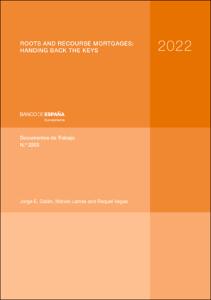Roots and recourse mortgages: handing back the keys
Autor
Fecha de publicación
3-feb-2022
Descripción física
50 p.
Resumen
En este estudio identificamos diferencias en las condiciones de las hipotecas asociadas al arraigo de los prestatarios tras separar este efecto de otros factores que explican dichas condiciones. Para esto usamos datos de préstamos hipotecarios en España de la Central de Información de Riesgos, complementados con datos de hipotecas titulizadas para un ciclo financiero completo. Identificamos que los prestatarios extranjeros con poco arraigo pagan tipos de interés más altos que aquellos con mayores vínculos en el país. También encontramos que un bajo nivel de arraigo está asociado con tasas más altas de impago y con mayores incentivos a no continuar pagando la deuda hipotecaria ante situaciones de patrimonio neto negativo. En general, identificamos que el arraigo es un factor muy relevante que explica las diferencias en las condiciones de las hipotecas en el momento de su concesión, así como las decisiones de impago. Desde el punto de vista de la política, nuestros resultados tienen importantes implicaciones para el entendimiento de las consecuencias de transitar hacia un régimen de dación en pago, y para la efectividad de la política macroprudencial.
In this study we disentangle the effect of roots from other confounding factors to explain differences in immigrants’ outcomes in the mortgage market. Using loan-level data from the Spanish Credit Register complemented with data on securitized mortgages over a complete financial cycle, we identify that foreign-born borrowers with shallow roots to the host country pay higher mortgage rates at origination than similar debtors that are better-settled. We also find that weak roots are associated with higher default rates and with greater incentives to go into default in negative equity situations. Overall, we show that rootedness explains differential loan conditions at origination and default behavior in mortgages. From a policy perspective, our results have important implications for understanding the potential consequences of moving away from recourse mortgage regimes, and for the effectiveness of macroprudential policy.
In this study we disentangle the effect of roots from other confounding factors to explain differences in immigrants’ outcomes in the mortgage market. Using loan-level data from the Spanish Credit Register complemented with data on securitized mortgages over a complete financial cycle, we identify that foreign-born borrowers with shallow roots to the host country pay higher mortgage rates at origination than similar debtors that are better-settled. We also find that weak roots are associated with higher default rates and with greater incentives to go into default in negative equity situations. Overall, we show that rootedness explains differential loan conditions at origination and default behavior in mortgages. From a policy perspective, our results have important implications for understanding the potential consequences of moving away from recourse mortgage regimes, and for the effectiveness of macroprudential policy.
Publicado en
Documentos de Trabajo / Banco de España, 2203
Otras versiones
Materias
Arraigo; Dación en pago; Hipotecas; Inmigrantes; Impago estratégico; Immigrants; Mortgage terms; Recourse mortgages; Roots; Strategic default; Economía urbana y vivienda; Instituciones financieras no bancarias; Relaciones laborales; Modelos econométricos; España
Aparece en las colecciones:












